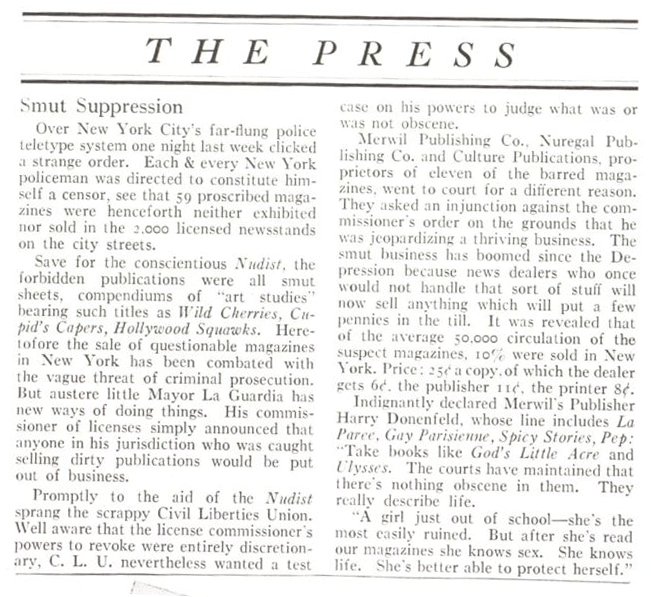Bacchus uncovers a historically-significant article, referenced in his research.
This 1934 primary source news article on censorship of pulp magazines (including the famous “Spicys”) in New York City makes several useful points:
- The many stories of Mayor La Guardia angrily discovering a “Spicy” title on a news stand 1942 are naive to whatever extent they are intended to suggest that he was actually surprised by the existence of salacious pulps in his city. By that point he had been fighting them for at least six years, so by 1942 he was probably play-acting his surprise if not his anger.
- The story estimates that “New York” (city or state not specified) is responsible for only 10% of the business in risque pulps in 1934, which undercuts the theory that New York City censorship could have directly or primarily have caused the demise of the shudder pulp trade.
- Smutty trends in the pulp business were supported, the story suggests, by hungry news stand operators post depression, raising the implication that the return of prosperity might have contributed to the decline of the smuttiest part of the trade.

“Smut Suppression”
Time Magazine
March 12, 1934Over New York City’s far-flung police teletype system one night last week clicked a strange order. Each & every New York policeman was directed to constitute himself a censor, see that 59 proscribed magazines were henceforth neither exhibited nor sold in the 2.000 licensed newsstands on the city streets.
Save for the conscientious Nudist, the forbidden publications were all smut sheets, compendiums of “art studies” bearing such titles as Wild Cherries, Cupid’s Capers, Hollywood Squawks. Heretofore the sale of questionable magazines in New York has been combated with the vague threat of criminal prosecution. But austere little Mayor La Guardiahas new ways of doing things. His commissioner of licenses simply announced that anyone in his jurisdiction who was caught selling dirty publications would be put out of business.
Promptly to the aid of the Nudist came the scrappy Civil Liberties Union. Well aware that the license comissioner’s powers to revoke were entirely discretionary, C.L.U. nevertheless wanted a test case on his powers to judge what was or was not obscene.
Merwil Publishing Co., Nuregal Publishing Co. and Culture Publications, proprietors of eleven of the barred magazines, went to court for a different reason. They asked an injunction against the commissioner’s order on the grounds that he was jeopardizing a thriving business. The smut business has boomed since the Depression because news dealers who once would not handle that sort of stuff will now sell anything which will put a few pennies in the till. it was revealed that of the average 30,000 circulation of the suspect magazines, 10% were sold in New York. Price: 25¢ a copy, of which the dealer gets 6¢, the publisher 11¢, the printer 8¢.
Indignantly declared Merwil’s Publisher Harry Donenfeld, whose line includes La Paree, Gay Parisienne, Spicy Stories, Pep: “Take books like God’s Little Acre and Ulysses. The courts have maintained that there’s nothing obscene in them. They really describe life.
“A girl just out of school — she’s the most easily ruined. But after she’s read our magazines she knows sex. She knows life. She’s better able to protect herself.”
